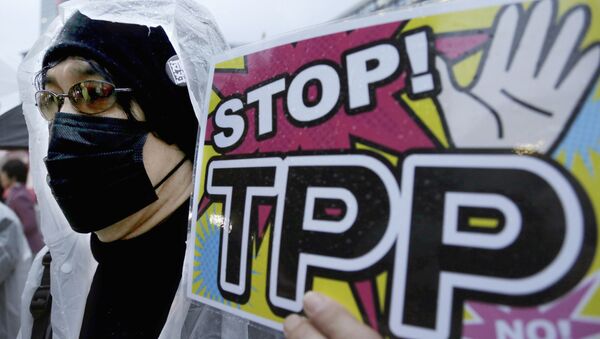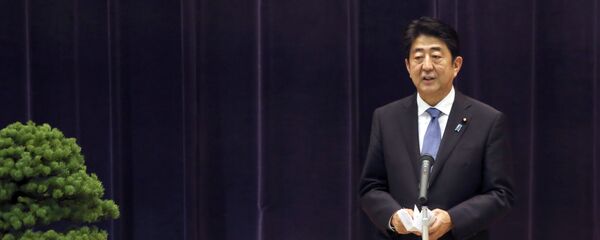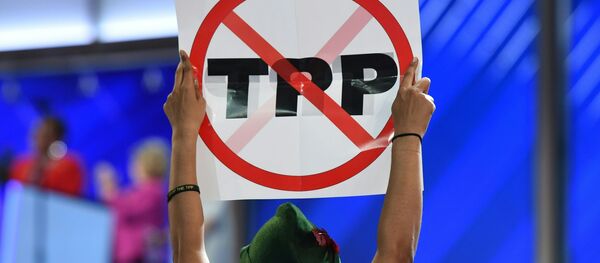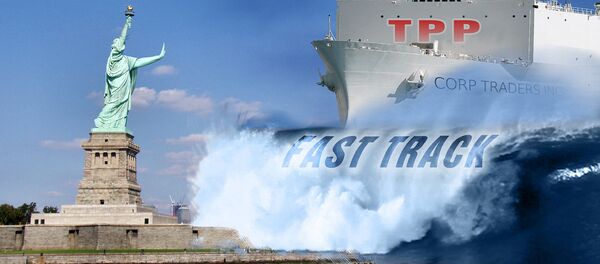TPP negotiations were finalized in October and must be ratified by all 12 signatories within the next two years.
The parties to the deal are Australia, Brunei, Canada, Chile, Japan, Malaysia, Mexico, New Zealand, Peru, Singapore, the United States and Vietnam, and comprise approximately 40 percent of world GDP.
The Japanese government's push to ratify the treaty faster than other states is due to the upcoming presidential election in the United States, which may complicate the issue since both candidates, Hillary Clinton and Donald Trump, have opposed the deal.
"Japan understands the need for profound structural economic reforms, and the TTP will guarantee significant preferences for the country. If established the TPP will control up to 40 percent of global trade," the expert told Sputnik Japan.
According to her, the TPP agreement would result in establishing brand-new conditions for trade and economic relations.
"Japan has a hi-tech economy and it will be involved in this integration. The removal of customs barriers will decrease prices for imported products, thus increasing purchasing capacity. Japan could use this situation to regain its positions against China," she pointed out.
This makes the TTP deal both economically and geopolitically important. China is not included in the agreement. The TPP could result in an economic alliance in the Pacific, in an attempt to counterbalance Beijing’s dominating positions in the region.
"In earlier years, Japan played the role of integrating force across Asia. Japan used to invest heavily into the economy of its neighbors and developed trade ties, but recently this role has diminished," Koroleva said.
There are two factors behind this trend. There are an economic downturn in Japan and China’s rising influence in the Asian-Pacific region.
This is why, Tokyo wants to take measures that would help counterbalance China’s role in the region.
However, there are certain risks that the Japanese opposition has repeatedly cited in the domestic debate over the TTP agreement.
"One of the main arguments by the opposition is the fact that the TPP negotiations have been secretive. No details have been made public, except for vague statements that the deal is going to be beneficial. And this looks strange and provokes comparison with the controversial TTIP (Transatlantic Trade and Partnership Deal) between the US and Europe," Koroleva said.
As for the TPP, Koroleva believes, Washington would benefit the most from the agreement. The partnership was discussed long ago but real steps were made only after Washington engaged, due to concerns about losing influence in Asia.
"Meanwhile, one of Japanese opposition websites reported that Japan’s incomes from the deal will be only 0.05 percent of GDP within 10 years. At the same time, US carmakers intend to increase their share in the Japanese market from 5 to 26 percent. This proves that even major Japanese corporations are unlikely to benefit from the deal," the analyst explained.
Koroleva noted that the TPP negotiations are underway amid the weakening role of the World Trade Organization (WTO). Another visible trend is fragmentation of global trade based on various criteria, first of all regional and geographical proximity.
"When a new trade bloc is created its rules might contradict with the norms of the WTO. Asian partners within the new alliance will focus on Asian markets which are geographically more accessible. Such difficulties may lead to significant changes to the global trade rules. This would be a global economic challenge," Koroleva suggested.






